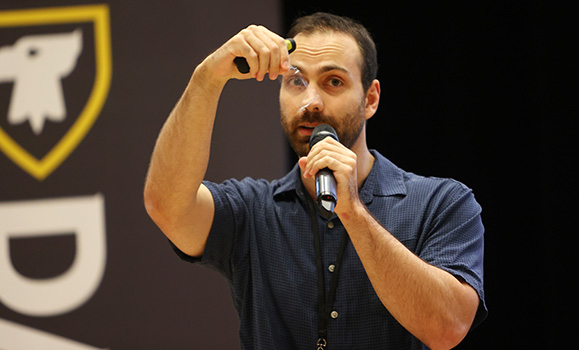"It was an amazing feeling once it set in, although it took a while to do so,ŌĆØ says Dr. Joe Bedard, the recent ║┌┴Ž│į╣Ž═°PhD in Chemistry grad about winning Lab Breakthrough of the Year at the global Falling Walls Lab competition in Berlin last November.
ŌĆ£I was genuinely stunned to find out I'd won ŌĆö the look on my face was pretty priceless. I had a lot of belief in my pitch and its groundbreaking potential, but there were so many top-level pitches from some really impressive people doing amazing things. Winning hadnŌĆÖt even crossed my mind.ŌĆØ
The journey to the competition at╠², an annual event frequented by Nobel Laureates and global thought leaders, began with DalhousieŌĆÖs regional Falling Walls Lab ŌĆö Atlantic Canada competition earlier that September. Dr. Bedard was one of 14 contenders to make their three-minute pitch for a research-based innovation to improve the world at the event. He came out at the top for his presentation on how plastics can be manufactured from nitrogen in the air, negating the need for petrochemicals.
He says he prizes his decision to get involved and makes a pitch to students and early career professionals currently on the fence about pursuing a spot in this yearŌĆÖs competition.
ŌĆ£First off, as a baseline, it ended up being a really fun challenge. If you donŌĆÖt think youŌĆÖre the right person to do this, or you think you need to work on your presentation skills, this will force you to improve. YouŌĆÖll end up being better than youŌĆÖd imagined you could be,ŌĆØ he says. ŌĆ£I got to meet incredible people, both at the Atlantic competition and the global competition. These connections can last forever, and they really opened up doors not just here in Canada, but globally. If thatŌĆÖs something that interests you, itŌĆÖs well worth giving it a shot.ŌĆØ
If his words of wisdom are not enough motivation, there are the prizes. The winner of DalhousieŌĆÖs region competition on September 17 receives an expense paid trip to Berlin to the finals, full registration to the Falling Walls Science Summit, and a $1,000 cash prize. Second place wins $500 and the PeoplesŌĆÖ Choice Award winner receives $250.╠²
Learn from the pro
We picked Dr. BedardŌĆÖs brain about the experience, how it helped him focus his research, and for tips that could help this yearŌĆÖs contenders repeat his winning performance.

Dr. Joe Bedard makes his pitch at the Dal competition.
Paint a picture of what itŌĆÖs like to be at the Falling Walls Science Summit?
The Falling Walls Science Summit is a conference unlike any other. My experience was incredible, irrespective of winning the Lab Breakthrough of the Year. I got to see groundbreaking results presented at the highest calibre by Nobel Laureates, and some who are surely going to earn that distinction in the future. Above all though, the sheer amount of optimism that radiates from the Science Summit really sets it apart.╠²
Did creating your presentation give you a new perspective on your science?
Absolutely. It wasnŌĆÖt until I had to find the ŌĆ£pitchŌĆØ that was buried in my labwork that I recognized the impact of what I was doing beyond simply academic curiosity. Part of that is the nature of my research, which started from a really fundamental place. I think that once I was forced to look at the downstream impact, I was actually a little surprised to realize there was a more direct line than IŌĆÖd initially thought.╠²
Did the competition open doors for you or help you in charting your professional journey?
Definitely. ThereŌĆÖs been a lot of interest in the work that I pitched at Falling Walls, and it was great exposure on a global scale, which isnŌĆÖt easy to come by! IŌĆÖd also say that it opened my eyes to a path I hadnŌĆÖt really considered before: taking an entrepreneurial approach to my science. I think sometimes itŌĆÖs important to recognize your science as a solution, and that the end user that youŌĆÖre developing it for may need that solution urgently.
What are the top three things that people need to keep in mind when preparing?
Number one, donŌĆÖt be afraid of going too ŌĆ£bigŌĆØ with your pitch when you start. YouŌĆÖll have to bring it back down to earth, but itŌĆÖs worth asking yourself what the absolute biggest possible impact your research can have, and work from there.╠²
Number two, perfect practice makes perfect. Get yourself comfortable pitching to large rooms, doing whatever you can to simulate that environment. ItŌĆÖs easy to freeze and forget your perfectly scripted pitch if you arenŌĆÖt comfortable with an audience!
And lastly, the judges arenŌĆÖt technical experts, and most of the audience wonŌĆÖt be either. That means the more you get into the nitty gritty, the more youŌĆÖll lose them. Keep everything big picture.

